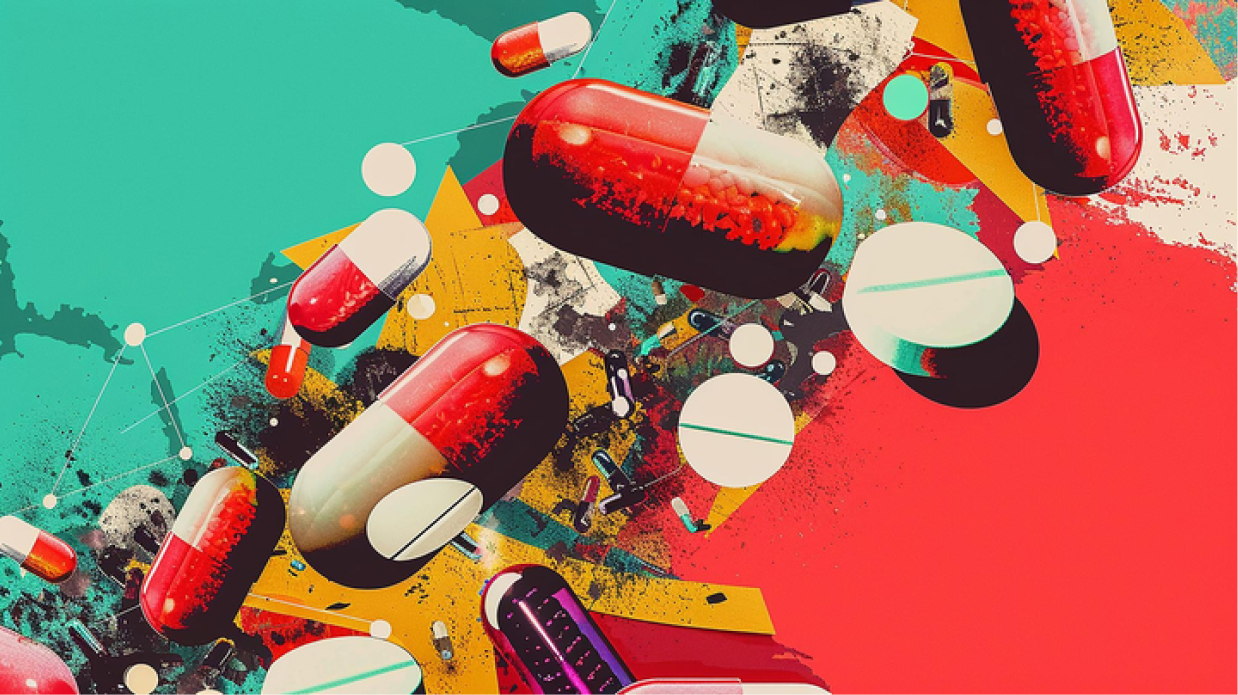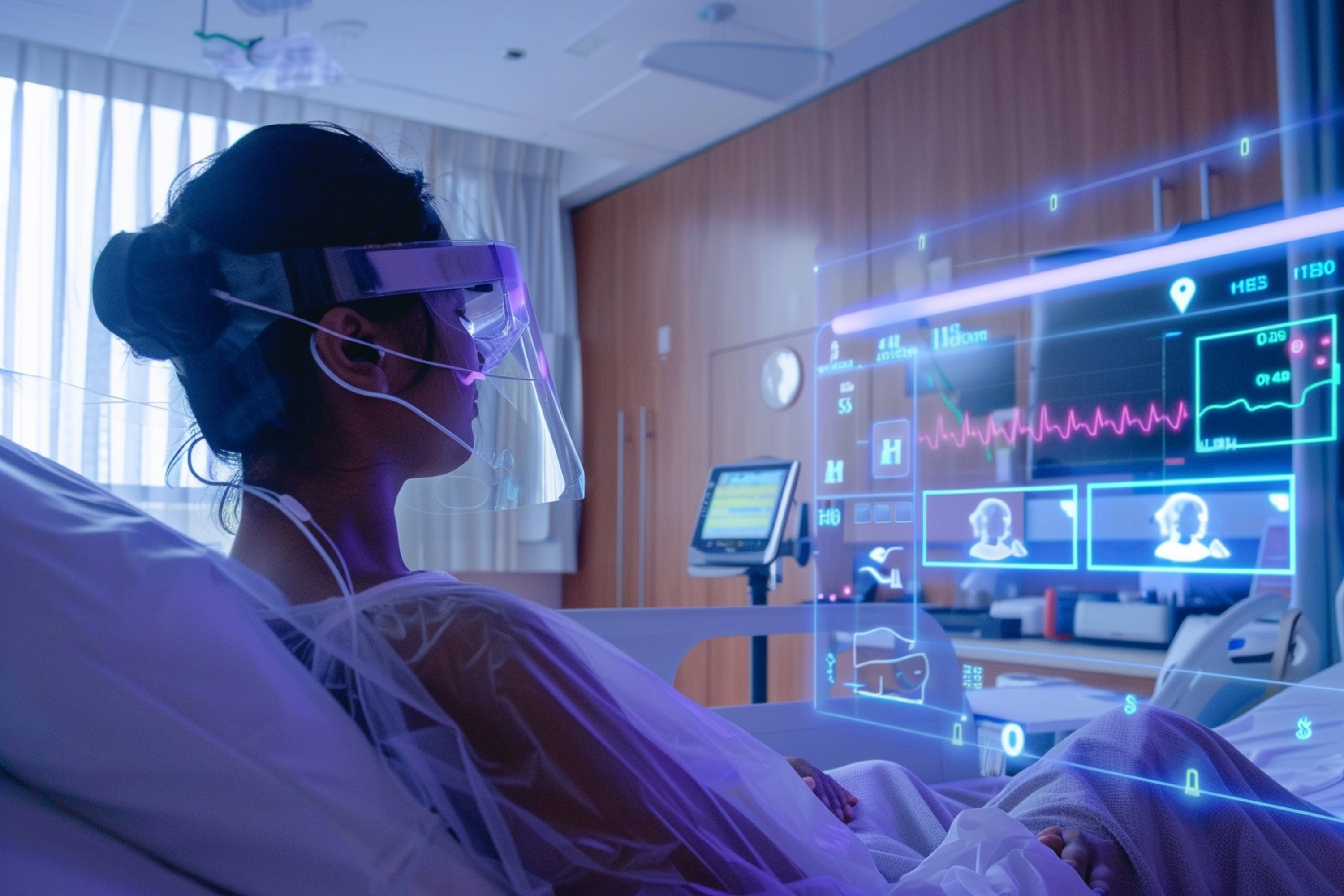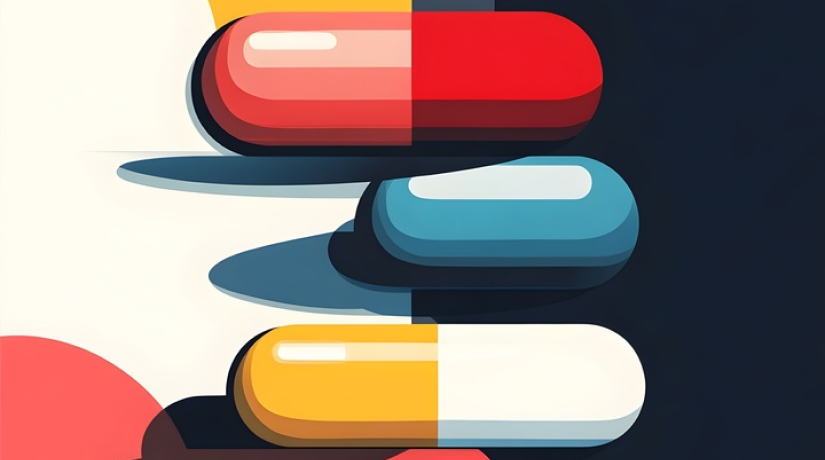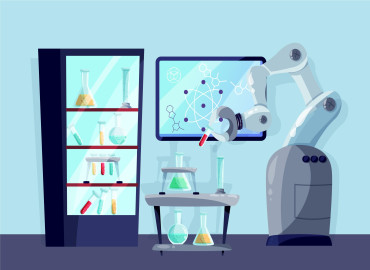by Dr. Vaishali Atri
6 minutes
The Transformative Role of Artificial Intelligence in Drug Discovery
Explore how AI is revolutionizing drug discovery, enhancing efficiency and innovation in the pharmaceutical industry.

The most expensive and challenging process that has been existing in the whole world is none other than the discovery of new drugs! It encompasses comprehensive timeframes as well as exceptional costs, which have definitely focused on the requirement for reform in this particular field. Although there have been prior attempts to accelerate the procedure of drug discovery utilizing computational techniques, advancements have been constrained.
Artificial intelligence (AI) has emerged as a promising innovation poised to transform drug discovery and development! It enables the discovery of ideal drug candidates, offers unparalleled insights into different diseases, and efficiently handles large sets of patient data. These abilities are leading to significant changes within the pharmaceutical industry.
So, in this article today we are going to discuss the applications of AI in drug discovery, its benefits and a few challenges in detail to understand how AI has revolutionized the pharmaceutical industry!
What Are The Applications Of Artificial Intelligence (AI) In Drug Discovery?
Here are a few important applications of AI in drug discovery that have made several processes simpler when compared to traditional methods!
1. Clinical Trials — Artificial Intelligence tends to improve various key aspects when it comes to clinical trials as they contribute to the identification of patient diseases & specific gene targets and anticipate molecular effects. In addition, AI-powered applications enhance medication adherence and allow risk-based monitoring, which results in improved efficiency and great success ratio for clinical trials.
2. Target Selection & Validation — AI-driven drug discovery helps in simplifying the procedure of identifying and assuring potential molecular targets by evaluating numerous datasets, that involves public libraries or drug information Banks. By utilizing binary classification, relief algorithms and deep autoencoders, AI-based drug discovery prioritizes all these targets efficiently. Moreover, artificial intelligence also employs graph-convolutional networks & computer vision models that are trained on cryo-EM microscope data in order to understand the protein structures.
3. Preclinical Studies — When it comes to molecular mechanisms of action & predicting does-response relationships in pharmacokinetic/pharmacodynamic modeling, AI plays a vital role here! It productively streamlines toxicology analysis via the Deeptox Algorithm, which precisely anticipates compound toxicity. In addition, deep learning algorithms tend to use transcriptomic information in order to come up with accurate predictions related to pharmacological characteristics.
4. Compound Screening & Lead Optimization — In compound screening, the utilization of AI-powered Virtual Screening aids in swiftly pinpointing potential lead molecules from vast compound databases. AI-driven Retrosynthesis Pathway Prediction streamlines chemical synthesis planning by automating the process. Additionally, AI-driven drug discovery models are pivotal in categorizing cell targets and enabling intelligent image-activated cell sorting, thereby enhancing cell separation efficiency.
What Are The Benefits Of Artificial Intelligence In Drug Discovery?
The utilization of artificial intelligence in drug discovery has a lot of key advantages for the pharmaceutical industry, let's have a look at them:
a) Streamlined Drug Development — The process of recognizing potential drug targets is now possible to accelerate to another level due to the inception of artificial intelligence in the field of drug discovery. By leveraging machine learning techniques, it enables rapid analysis of huge datasets, stimulating the smooth & quick identification of potential drug candidates. This expedites the lead discovery phase, ultimately conserving valuable time and resources for industry experts, researchers and pharmaceutical firms.
b) Improved Therapeutics — The combination of drug discovery & artificial intelligence has a crucial role to play in anticipating the pharmacological characteristics of lead molecules on the basis of their chemical structure, which ultimately makes the development of drugs in a more effective way!
With the utilization of machine learning algorithms, it's possible for industry experts & researchers to come up with predictive models that estimate major characteristics such as toxicity, bioavailability and solubility. These types of modes provide a thorough guidance about the design of new molecules with enhanced pharmacological properties, improving the safety & efficiency of prospective drug candidates.
c) Patient Segmentation — AI-driven drug discovery tends to demonstrate its worth by effectively categorizing patients. It helps in identifying certain patient groups who are dealing with similar disease profiles & traits. By leveraging predictive modeling and biomarker detection, AI enables healthcare professionals to tailor treatment strategies, resulting in enhanced drug development success rates and ultimately better patient outcomes.
d) Quality Control — AI also has a crucial role to play in improving the efficiency as well as accuracy of multiple processes related to quality assurance in the area of drug quality assurence. By leveraging computer vision algorithms for packaging inconsistencies, identifying imperfections, and automated inspection. This makes sure that the drugs are able to meet the exact quality standards.
In addition, when it comes to AI algorithms, they help to evaluate sensor data from different manufacturing tools & equipment. This enables predictive maintenance measures in order to avoid failure of equipment & reduce downtime of the production process. Artificial intelligence also helps in detecting fraud by studying the data of sales & distribution to find suspicious activities, thereby making sure that the safety and integrity of drug distribution channels is maintained properly.
e) Enhanced Clinical Trial Design — AI helps in improving the clinical trial design. It analyzes the data of patients & electronic medical records, and then streamlines the patient recruitment process by recognizing ideal candidates in an efficient manner. In addition, artificial intelligence aids in optimizing clinical trial designs by detecting the subgroups of patients that are more likely to respond in a positive way for certain treatments.
The use of wearable devices powered by AI enables continuous monitoring in real-time, ensuring accurate data gathering and necessary adaptations to trial protocols in order to improve patient safety. Furthermore, AI algorithms aid in thorough data analysis, providing valuable insights for upcoming research and clinical procedures.
Challenges Of Integrating Artificial Integration In Drug Discovery
As we learnt that AI has been a promising tool in the area of drug discovery, but you must also know that its widespread adoption is still facing a lot of challenges. But what are those challenges? Well, let's read about them!
- Integration & Validation: AI models are required to be validated & then integrated into the drug discovery processes in a scalable, reliable and effective way. This often demands for careful & strategic planning, and collaborating with stakeholders such as chemists, biologists, data scientists, regulatory authorities, etc.
- Data Quality & Quantity: In point of fact, AI completely relies on high-quality data in order to produce precise predictions & models. However, information in drug discovery is generally scattered, heterogeneous and of different quality, which makes it difficult for artificial intelligence to precisely evaluate and model the information.
- Absence Of Standardization: Enhanced standardization is required in data formats, collection, and analysis methods within drug discovery. Without this, comparing results across various studies and datasets becomes challenging, thus restricting the accuracy of AI-generated predictions and models.
- Expense & Technical Proficiency: Implementing artificial intelligence in drug discovery needs a heavy investment in terms of technical and financial resources, which includes developing & maintaining infrastructure and recruiting skilled AI experts & data scientists.
- Privacy Of Data & Regulatory Compliance: These two are major concerns when it comes to working with sensitive data of the patients. The utilization of artificial intelligence in drug discovery needs to be in compliance with data protection & privacy regulations, such as General Data Protection Regulation (GDPR) in the EU and HIPAA in the United States.
In Conclusion
The incorporation of artificial intelligence (AI) into drug discovery has the capacity to transform both the pharmaceutical industry and healthcare sector! It has the potential to speed up the process of drug development, enhance the designs of clinical trials, guarantee quality control and forecast drug effectiveness!
FAQs
1) How Is Artificial Intelligence Being Utilized In Drug Discovery?
AI is being utilized in drug discovery in various methods. Initially, it sifts through databases of chemicals, anticipating the interactions between various compounds and proteins. Besides that, it also analyzes specific patient information to develop personalized treatment approaches. Furthermore, AI aids in optimizing clinical trials, enhancing the overall productivity of the research journey.
2) How AI Has Brought A Significant Change In Drug Discovery?
Artificial intelligence is transforming the drug discovery area by accelerating the identification for potential therapeutics. Moreover, it has enabled the development of personalized treatments making it more feasible and easier to identify new utilization of the existing drugs.
3) What Is The Impact Of AI On The Expenses & Duration Of Drug Discovery?
Artificial intelligence has the potential to enhance drug discovery by refining compound selection and streamlining clinical trial setups, thereby reducing the expenses incurred for research and development. Through expediting the identification of promising drug candidates and optimizing the clinical trial process, AI can accelerate the delivery of new treatments to patients.




